Deck 10: The Integration of Genetic Approaches: Understanding Sickle Cell Disease
Question
Question
Question
Question
Question
Question
Question
Question
Question
Question
Question
Question
Question
Question
Question
Question
Question
Question
Question
Question
Question
Question
Question
Question
Question
Question
Question
Question
Question
Question
Question
Question
Question
Question
Question
Question
Question
Question
Question
Question
Question
Question
Question
Question
Question
Question
Question
Question

Unlock Deck
Sign up to unlock the cards in this deck!
Unlock Deck
Unlock Deck
1/48
Play
Full screen (f)
Deck 10: The Integration of Genetic Approaches: Understanding Sickle Cell Disease
1
Hemoglobin, the protein responsible for binding and transporting oxygen, forms a tetramer. What is the protein composition of the most common form of hemoglobin, hemoglobin A (HbA)?
A)α1β1
B)α1β2
C)α2β1
D)α2β2
E)α2βS
A)α1β1
B)α1β2
C)α2β1
D)α2β2
E)α2βS
D
2
Molecular charge is an important characteristic influencing protein migration on a gel. What accounts for the variation in the molecular charge of proteins?
A)the intronic sequences of the protein
B)the amino acid composition of the protein
C)the negative charge of the sugar-phosphate backbone
D)the amount of protein loaded into the wells of the gel
E)the presence of secondary structures in the protein
A)the intronic sequences of the protein
B)the amino acid composition of the protein
C)the negative charge of the sugar-phosphate backbone
D)the amount of protein loaded into the wells of the gel
E)the presence of secondary structures in the protein
B
3
The mutation that causes SCD causes what kind of change in the structure of hemoglobin?
A)decreases heme-binding ability
B)fewer chains of amino acids (trimeric rather than tetrameric structure)
C)a single amino acid substitution that alters the structure of the tetramer
D)addition of a single amino acid that causes a longer protein subunit
E)loss of a single amino acid that causes a frameshift and premature stop codon
A)decreases heme-binding ability
B)fewer chains of amino acids (trimeric rather than tetrameric structure)
C)a single amino acid substitution that alters the structure of the tetramer
D)addition of a single amino acid that causes a longer protein subunit
E)loss of a single amino acid that causes a frameshift and premature stop codon
C
4
How is the DNA visualized on a Southern blot?
A)ethidium bromide
B)radioactively labeled probes
C)chemically labeled probes
D)both ethidium bromide and chemically labeled probes
E)either radioactively labeled probes or chemically labeled probes
A)ethidium bromide
B)radioactively labeled probes
C)chemically labeled probes
D)both ethidium bromide and chemically labeled probes
E)either radioactively labeled probes or chemically labeled probes

Unlock Deck
Unlock for access to all 48 flashcards in this deck.
Unlock Deck
k this deck
5
As part of the maturation process, red blood cells lose their nucleus. What is the consequence for cell division in these cells?

Unlock Deck
Unlock for access to all 48 flashcards in this deck.
Unlock Deck
k this deck
6
Two probes, A and B, hybridize very near each other in a region of DNA that contains RFLPs when digested with HindIII. The four maps show the location and intervening distances of the HindIII restriction sites and the binding locations of probes A and B. The maps show alleles H1-H4 present in a population. What band(s)is/are seen in Southern blot analysis of a H2H3 heterozygote using probe B? 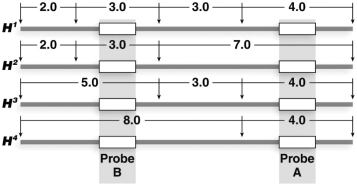
A)3 kb and 5 kb
B)3 kb and 8 kb
C)3kb, 2kb, and 8 kb
D)5 kb and 8 kb
E)2 kb, 3 kb, and 5 kb

A)3 kb and 5 kb
B)3 kb and 8 kb
C)3kb, 2kb, and 8 kb
D)5 kb and 8 kb
E)2 kb, 3 kb, and 5 kb

Unlock Deck
Unlock for access to all 48 flashcards in this deck.
Unlock Deck
k this deck
7
You set up an EcoRI restriction digest for a sample of genomic DNA from an individual with a mutation in the β-globin gene. You perform a Southern blot using the entire β-globin gene as a probe. To your surprise, you notice a different pattern of bands in the affected individual - you have identified a new SNP! What can you conclude from the pattern of bands from the Southern blot below? 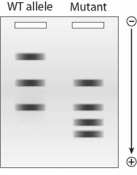
A)The SNP resulted in the loss of an EcoRI site.
B)The SNP resulted in the creation of a new EcoRI site.
C)The SNP resulted in the loss of an exon.
D)The SNP results in the creation of a new HindIII site.
E)There was no change in the genomic DNA sequence.

A)The SNP resulted in the loss of an EcoRI site.
B)The SNP resulted in the creation of a new EcoRI site.
C)The SNP resulted in the loss of an exon.
D)The SNP results in the creation of a new HindIII site.
E)There was no change in the genomic DNA sequence.

Unlock Deck
Unlock for access to all 48 flashcards in this deck.
Unlock Deck
k this deck
8
Sickle cell is a codominant disease, meaning that heterozygotes exhibit an intermediate blood cell phenotype (a mixture of normal and sickle cells)due to the blend of hemoglobin tetramers in each red blood cell. Which of the following tetramer structures would you expect to find in a carrier of SCD? 
A)α2βA2
B)α2βSβA
C)α2βS2
D)α2βA2 and α2βSβA
E)α2βA2 and α2βSβA and α2βS2

A)α2βA2
B)α2βSβA
C)α2βS2
D)α2βA2 and α2βSβA
E)α2βA2 and α2βSβA and α2βS2

Unlock Deck
Unlock for access to all 48 flashcards in this deck.
Unlock Deck
k this deck
9
Which of the following techniques describes either the rate of a molecule's migration or its final position in a gel?
A)hybridization
B)electrophoretic mobility
C)densitometry
D)restriction fragment analysis
E)peptide fingerprint analysis
A)hybridization
B)electrophoretic mobility
C)densitometry
D)restriction fragment analysis
E)peptide fingerprint analysis

Unlock Deck
Unlock for access to all 48 flashcards in this deck.
Unlock Deck
k this deck
10
Given what you know of the inheritance pattern of SCD, what can be said of individual II-5? 
A)He is a carrier because his mother was affected and his son was affected.
B)His children with II-4 will have a 50% chance of being carriers (βAβS).
C)His children with II-4 will all have a 50% chance of being affected (βSβS).
D)A and B are correct.
E)A, B, and C are correct.

A)He is a carrier because his mother was affected and his son was affected.
B)His children with II-4 will have a 50% chance of being carriers (βAβS).
C)His children with II-4 will all have a 50% chance of being affected (βSβS).
D)A and B are correct.
E)A, B, and C are correct.

Unlock Deck
Unlock for access to all 48 flashcards in this deck.
Unlock Deck
k this deck
11
Which of the following techniques quantifies the amount of protein present in a gel lane by measuring how much light is blocked from passing through the gel by the presence of a band of protein?
A)hybridization
B)electrophoretic mobility
C)densitometry
D)restriction fragment analysis
E)peptide fingerprint analysis
A)hybridization
B)electrophoretic mobility
C)densitometry
D)restriction fragment analysis
E)peptide fingerprint analysis

Unlock Deck
Unlock for access to all 48 flashcards in this deck.
Unlock Deck
k this deck
12
Given what you know of the inheritance pattern of SCD, is the following pedigree representative of a typical SCD pedigree? 
A)Yes; this is a pedigree showing dominant inheritance, and SCD exhibits dominant inheritance.
B)Yes; this is a pedigree showing recessive inheritance, and SCD exhibits recessive inheritance.
C)No; this is a pedigree showing dominant inheritance, and SCD exhibits recessive inheritance.
D)No; this is a pedigree showing recessive inheritance, and SCD exhibits dominant inheritance.
E)Another generation is needed before you can determine mode of inheritance.

A)Yes; this is a pedigree showing dominant inheritance, and SCD exhibits dominant inheritance.
B)Yes; this is a pedigree showing recessive inheritance, and SCD exhibits recessive inheritance.
C)No; this is a pedigree showing dominant inheritance, and SCD exhibits recessive inheritance.
D)No; this is a pedigree showing recessive inheritance, and SCD exhibits dominant inheritance.
E)Another generation is needed before you can determine mode of inheritance.

Unlock Deck
Unlock for access to all 48 flashcards in this deck.
Unlock Deck
k this deck
13
Can Southern and northern blotting detect differences between WT and mutant β-globin gene or between WT and mRNA or both?
A)Only differences between WT and the gene can be detected.
B)Only differences between WT and the mRNA can be detected.
C)Differences between the WT and both the gene and the mRNA can be detected.
D)Neither differences between WT and the gene nor between WT and the mRNA can be detected.
A)Only differences between WT and the gene can be detected.
B)Only differences between WT and the mRNA can be detected.
C)Differences between the WT and both the gene and the mRNA can be detected.
D)Neither differences between WT and the gene nor between WT and the mRNA can be detected.

Unlock Deck
Unlock for access to all 48 flashcards in this deck.
Unlock Deck
k this deck
14
You are interested in designing a molecular probe to detect the region of βS SNP, which includes a DdeI (CTNAG)restriction site. Which of the following molecular probe sequences would anneal to the correct position?
A)ACTCCTGAGGAGAAG
B)TGAGGACTCCTCTTC
C)GTGCACCTGACTCCT
D)CACGTGGACTGAGGA
E)CACGUGGACUGAGGA
A)ACTCCTGAGGAGAAG
B)TGAGGACTCCTCTTC
C)GTGCACCTGACTCCT
D)CACGTGGACTGAGGA
E)CACGUGGACUGAGGA

Unlock Deck
Unlock for access to all 48 flashcards in this deck.
Unlock Deck
k this deck
15
At a biological level, βAβS heterozygotes suffer fewer cases of malaria than βAβA homozygotes, and when they do get malaria, their disease is less severe. What is the biological explanation for the heterozygous advantage? 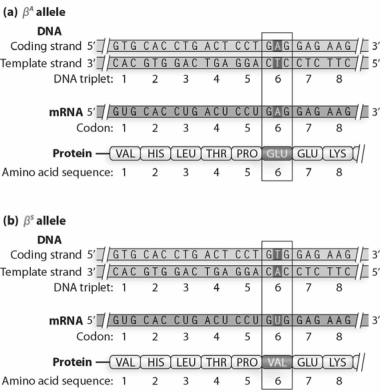
A)The βAβA homozygotes have a shortened average life span of their red blood cells, and the shorter RBC life spans interrupt the developmental cycle of Plasmodium larvae by causing the parasites to mature and reproduce rapidly.
B)The βAβS heterozygotes have a shortened average life span of their red blood cells, and the shorter RBC life spans interrupt the developmental cycle of Plasmodium larvae by preventing many of the immature parasites from reaching maturity.
C)The sickle-cell shape of the RBCs in βAβS heterozygotes causes the Plasmodium larvae to become stuck in the RBC aggregates, which prevents reproduction.
D)The anemia associated with SCD makes the βAβS heterozygotes less attractive to mosquitoes, so they experience fewer mosquito bites and less opportunity for infection by Plasmodium larvae.
E)The βAβS heterozygotes are bitten by mosquitoes less frequently, and when they are infected, the sickle-cell shape of the RBCs in βAβS heterozygotes causes the Plasmodium larvae to become stuck in the RBC aggregates, which prevents reproduction.

A)The βAβA homozygotes have a shortened average life span of their red blood cells, and the shorter RBC life spans interrupt the developmental cycle of Plasmodium larvae by causing the parasites to mature and reproduce rapidly.
B)The βAβS heterozygotes have a shortened average life span of their red blood cells, and the shorter RBC life spans interrupt the developmental cycle of Plasmodium larvae by preventing many of the immature parasites from reaching maturity.
C)The sickle-cell shape of the RBCs in βAβS heterozygotes causes the Plasmodium larvae to become stuck in the RBC aggregates, which prevents reproduction.
D)The anemia associated with SCD makes the βAβS heterozygotes less attractive to mosquitoes, so they experience fewer mosquito bites and less opportunity for infection by Plasmodium larvae.
E)The βAβS heterozygotes are bitten by mosquitoes less frequently, and when they are infected, the sickle-cell shape of the RBCs in βAβS heterozygotes causes the Plasmodium larvae to become stuck in the RBC aggregates, which prevents reproduction.

Unlock Deck
Unlock for access to all 48 flashcards in this deck.
Unlock Deck
k this deck
16
From a standpoint of natural selection, we see that the heterozygous advantage for βAβS individuals is balanced by the disadvantage to those with SCD or the wild-type alleles (and no malaria protection). The action of these conflicting trends produces an overall increase in the mutant allele until it reaches a state where the gain and loss of βS alleles is equal. What is the term for this stable condition that allows mutant alleles to remain in a particular population?
A)equilibrium frequency
B)heterozygote fitness
C)restriction fragment length polymorphism
D)single nucleotide polymorphism
E)balanced polymorphism
A)equilibrium frequency
B)heterozygote fitness
C)restriction fragment length polymorphism
D)single nucleotide polymorphism
E)balanced polymorphism

Unlock Deck
Unlock for access to all 48 flashcards in this deck.
Unlock Deck
k this deck
17
What term is used to describe the situation when the loss of an allele because of selection against one of its phenotypes is balanced by natural selection in favor of the allele for another phenotype?
A)equilibrium frequency
B)heterozygote fitness
C)restriction fragment length polymorphism
D)single nucleotide polymorphism
E)balanced polymorphism
A)equilibrium frequency
B)heterozygote fitness
C)restriction fragment length polymorphism
D)single nucleotide polymorphism
E)balanced polymorphism

Unlock Deck
Unlock for access to all 48 flashcards in this deck.
Unlock Deck
k this deck
18
A couple has four children; one is affected by SCD, and two are carriers of the disease. What can be said of the genotypes of the parents?

Unlock Deck
Unlock for access to all 48 flashcards in this deck.
Unlock Deck
k this deck
19
Thalassemia is a recessive blood disease caused by reduced synthesis of one of the globin genes. While SCD is a mutation in the structure of hemoglobin, thalassemias can also be caused by mutations in the regulatory elements, causing too little globin to be produced and resulting in anemia. You've designed a DNA probe that you want to use to screen a family for a rare mutation in the β-globin gene that causes thalassemia. First you will use the probe for northern blotting. What information will the northern blot tell you?
A)whether the mRNA for β-globin is being translated into functional proteins in a given cell population
B)whether the amount of the β-globin gene being transcribed (mRNA levels)is within normal range
C)the size of the mRNA being transcribed
D)the presence of a particular mutation by restriction fragment analysis
E)both B and C are correct
A)whether the mRNA for β-globin is being translated into functional proteins in a given cell population
B)whether the amount of the β-globin gene being transcribed (mRNA levels)is within normal range
C)the size of the mRNA being transcribed
D)the presence of a particular mutation by restriction fragment analysis
E)both B and C are correct

Unlock Deck
Unlock for access to all 48 flashcards in this deck.
Unlock Deck
k this deck
20
Ingram examined hemoglobin structural variation by breaking down the hemoglobin protein into many fragments by chemical treatment and subjecting the fragments to electrophoresis to separate them in a gel; and then in a second dimension, perpendicular to the first, he separated them by chromatography. This two-step approach is commonly referred to as __________.
A)hybridization
B)electrophoretic mobility
C)densitometry
D)restriction fragment analysis
E)peptide fingerprint analysis
A)hybridization
B)electrophoretic mobility
C)densitometry
D)restriction fragment analysis
E)peptide fingerprint analysis

Unlock Deck
Unlock for access to all 48 flashcards in this deck.
Unlock Deck
k this deck
21
You have digested a molecule of DNA and want to identify a specific fragment of interest. The DNA is subjected to gel electrophoresis, but you get two bands that are very close in size. What could you use to determine which band is the correct one?

Unlock Deck
Unlock for access to all 48 flashcards in this deck.
Unlock Deck
k this deck
22
Which of the following images represents the expected results of a DNA gel for three individuals with different genotypes-homozygous dominant (lane 1), heterozygote (lane 2), and homozygous recessive (lane 3)? 


Unlock Deck
Unlock for access to all 48 flashcards in this deck.
Unlock Deck
k this deck
23
A restriction map of βA and βS is shown. Members of a family were analyzed by cutting their DNA with DdeI. Which individuals in the family have the genotype βAβA? 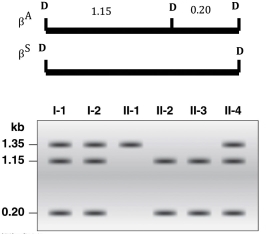


Unlock Deck
Unlock for access to all 48 flashcards in this deck.
Unlock Deck
k this deck
24
Given the following plasmid, what are the sizes of the fragments you would expect from a NotI digest? 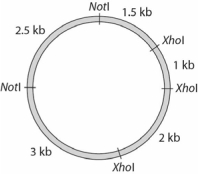


Unlock Deck
Unlock for access to all 48 flashcards in this deck.
Unlock Deck
k this deck
25
The rate of molecule movement in electrophoretic gels depends on three parameters of molecular structure. Each of these parameters individually is important in determining how a particular molecule migrates, but they can also interact with one another to produce a characteristic migration rate for each molecule. What are the three parameters?

Unlock Deck
Unlock for access to all 48 flashcards in this deck.
Unlock Deck
k this deck
26
The bone marrow must continuously generate new red blood cells because the life span of a typical red blood cell is only ________. The life span is even shorter in individuals with sickle-cell trait, which accounts for the protective effects against malaria.

Unlock Deck
Unlock for access to all 48 flashcards in this deck.
Unlock Deck
k this deck
27
Based only on this Southern blot and with no knowledge of which of the β-globin SNPs you are looking at, which lane(s)might represent(s)a heterozygous individual? 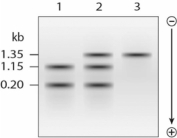


Unlock Deck
Unlock for access to all 48 flashcards in this deck.
Unlock Deck
k this deck
28
Given the following plasmid, what are the sizes of the fragments you would expect from an XhoI digest? 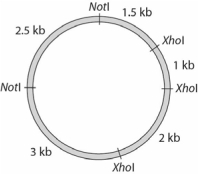


Unlock Deck
Unlock for access to all 48 flashcards in this deck.
Unlock Deck
k this deck
29
Given the following gel, which DNA fragment has a lower electrophoretic mobility? 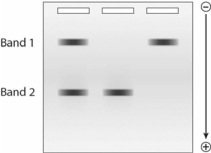


Unlock Deck
Unlock for access to all 48 flashcards in this deck.
Unlock Deck
k this deck
30
Given the following gel, which DNA fragment has a lower molecular mass? 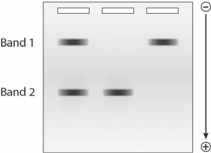


Unlock Deck
Unlock for access to all 48 flashcards in this deck.
Unlock Deck
k this deck
31
Hemoglobin is made up of four proteins from two different gene clusters, the α-globin gene cluster and the β-globin gene cluster. The two clusters are related, having evolved from a common ancestral gene through gene duplication, based on strong similarities in which three gene characteristics?

Unlock Deck
Unlock for access to all 48 flashcards in this deck.
Unlock Deck
k this deck
32
Given the following gel, which protein has a more negative charge? 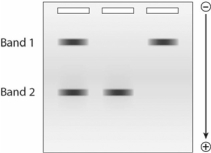


Unlock Deck
Unlock for access to all 48 flashcards in this deck.
Unlock Deck
k this deck
33
Sodium dodecyl sulfate (SDS)is a detergent commonly added to protein samples before gel electrophoresis. The purpose of the negatively charged SDS is to neutralize the charges and denature the protein to remove secondary structures. Thus, the proteins can be separated on a gel based solely on what parameter?

Unlock Deck
Unlock for access to all 48 flashcards in this deck.
Unlock Deck
k this deck
34
Before transferring DNA from a gel to the membrane in Southern blotting, the DNA must be denatured (usually by soaking the gel in NaOH). Why is this step necessary?

Unlock Deck
Unlock for access to all 48 flashcards in this deck.
Unlock Deck
k this deck
35
Globin genes contain ________ segments that ultimately encode the amino acids of the protein and interspersed ________ sequences that do not contribute to encoding the protein product of the gene.

Unlock Deck
Unlock for access to all 48 flashcards in this deck.
Unlock Deck
k this deck
36
A SNP results in a loss of the XhoI site indicated in the bacterial plasmid below. You design a molecular probe that spans the lost XhoI site. Which lane represents the expected Southern blot of a bacterial cell that carries two copies of the plasmid: a normal version and the version with the lost XhoI site? 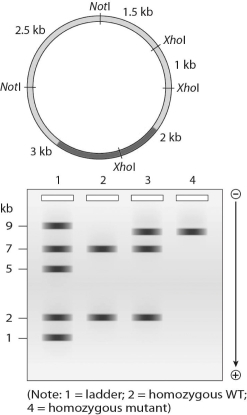


Unlock Deck
Unlock for access to all 48 flashcards in this deck.
Unlock Deck
k this deck
37
Given the following Southern blot results, which lane represents a heterozygous individual? 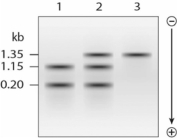


Unlock Deck
Unlock for access to all 48 flashcards in this deck.
Unlock Deck
k this deck
38
The different globin genes in each cluster are sequentially expressed in tightly controlled patterns during the various stages of prenatal and adult development. What gene structure helps regulate globin gene transcription by controlling both the timing and the starting point for transcribing DNA into mRNA?

Unlock Deck
Unlock for access to all 48 flashcards in this deck.
Unlock Deck
k this deck
39
What information allows you to predict the pattern of DNA bands expected in a Southern blot of an individual with the wild-type allele?

Unlock Deck
Unlock for access to all 48 flashcards in this deck.
Unlock Deck
k this deck
40
Given the following gel, which protein is more likely to have a globular shape? 


Unlock Deck
Unlock for access to all 48 flashcards in this deck.
Unlock Deck
k this deck
41
The intercalating agent ________ allows researchers to visualize DNA and RNA on a gel when the gel is exposed to UV light.

Unlock Deck
Unlock for access to all 48 flashcards in this deck.
Unlock Deck
k this deck
42
Burkitt's lymphoma is a cancer of the lymphatic system. The endemic variant, common to equatorial Africa, commonly affects children who are also affected by chronic malaria. A recent study found that individuals with AA hemoglobin were twice as likely to develop Burkitt's lymphoma as those with the AS genotype. We saw a similar benefit of certain genotypes in cases
of sickle cell disease. Recall that individuals who are βAβS, βAβC, or βAβE have a survival and reproductive advantage over individuals who are homozygous βAβA (and therefore succumb more easily to malaria)and over those who are homozygous for the mutant alleles (and therefore suffer from hereditary anemia). Resistance to malaria and Burkitt's lymphoma are both an example of ________ advantage.
of sickle cell disease. Recall that individuals who are βAβS, βAβC, or βAβE have a survival and reproductive advantage over individuals who are homozygous βAβA (and therefore succumb more easily to malaria)and over those who are homozygous for the mutant alleles (and therefore suffer from hereditary anemia). Resistance to malaria and Burkitt's lymphoma are both an example of ________ advantage.

Unlock Deck
Unlock for access to all 48 flashcards in this deck.
Unlock Deck
k this deck
43
Northern blotting is not useful in detecting the SNPs associated with the βA and βS alleles. Explain why.

Unlock Deck
Unlock for access to all 48 flashcards in this deck.
Unlock Deck
k this deck
44
Being a carrier of the sickle cell trait, although generally not a serious problem, can pose significant risks for athletes, particularly those in intense training regimens. The death of Florida State University linebacker Devaughn Darling, a carrier of the sickle cell trait, in a spring conditioning drill refocused attention on sickle cell abnormalities, including both sickle cell disease and sickle cell trait (carriers). High altitude, aggressive exercise, and high temperatures can all lead to acute rhabdomyolysis in individuals with sickle cell trait. Why do you think an individual who is a carrier of the sickle cell trait may be more likely to experience the symptoms of SCD during rigorous exercise?

Unlock Deck
Unlock for access to all 48 flashcards in this deck.
Unlock Deck
k this deck
45
We saw that Southern blotting of DNA from the βA allele produces two DNA bands corresponding to fragment lengths of 1150 bp and 200 bp based on the location of two DdeI sites. In contrast, Southern blot analysis of βS-allele DNA produces a single DNA restriction fragment, measuring 1350 bp in length, since one of the DdeI sites is altered by SNP variation. Why is Southern blotting necessary to identify the correct bands-if you know the sizes, why can't you just identify your band on a gel? Why is the location of the probe (spanning the predicted lost DdeI site)important?

Unlock Deck
Unlock for access to all 48 flashcards in this deck.
Unlock Deck
k this deck
46
Describe the hypothesis that James Neel proposed to describe the inheritance pattern of SCD. What experimental methods did he use to prove his hypothesis?

Unlock Deck
Unlock for access to all 48 flashcards in this deck.
Unlock Deck
k this deck
47
We can detect the SNP in the βS allele because it destroys a DdeI restriction site, leading to DNA restriction fragment variation revealed by Southern blot analysis.
Either two or three restriction sequences for the restriction endonuclease DdeI can occur near the
β-globin gene, depending on the allele. One DdeI restriction sequence is eliminated from the βS allele by the SNP in the mutant allele because of a mutation in the double-stranded target sequence 5′ - CTNAG - 3′.
Suppose the wild-type allele sequence is CCTGAG, while a newly identified SNP is CCTTAG. Would this same restriction fragment analysis technique be appropriate for detecting this particular SNP? What other technique(s)could you use to identify this particular mutation?
Either two or three restriction sequences for the restriction endonuclease DdeI can occur near the
β-globin gene, depending on the allele. One DdeI restriction sequence is eliminated from the βS allele by the SNP in the mutant allele because of a mutation in the double-stranded target sequence 5′ - CTNAG - 3′.
Suppose the wild-type allele sequence is CCTGAG, while a newly identified SNP is CCTTAG. Would this same restriction fragment analysis technique be appropriate for detecting this particular SNP? What other technique(s)could you use to identify this particular mutation?

Unlock Deck
Unlock for access to all 48 flashcards in this deck.
Unlock Deck
k this deck
48
In contrast to the nucleic acid probes used to detect DNA or RNA target sequences, molecular probes used to detect target proteins in western blots are ________.

Unlock Deck
Unlock for access to all 48 flashcards in this deck.
Unlock Deck
k this deck


